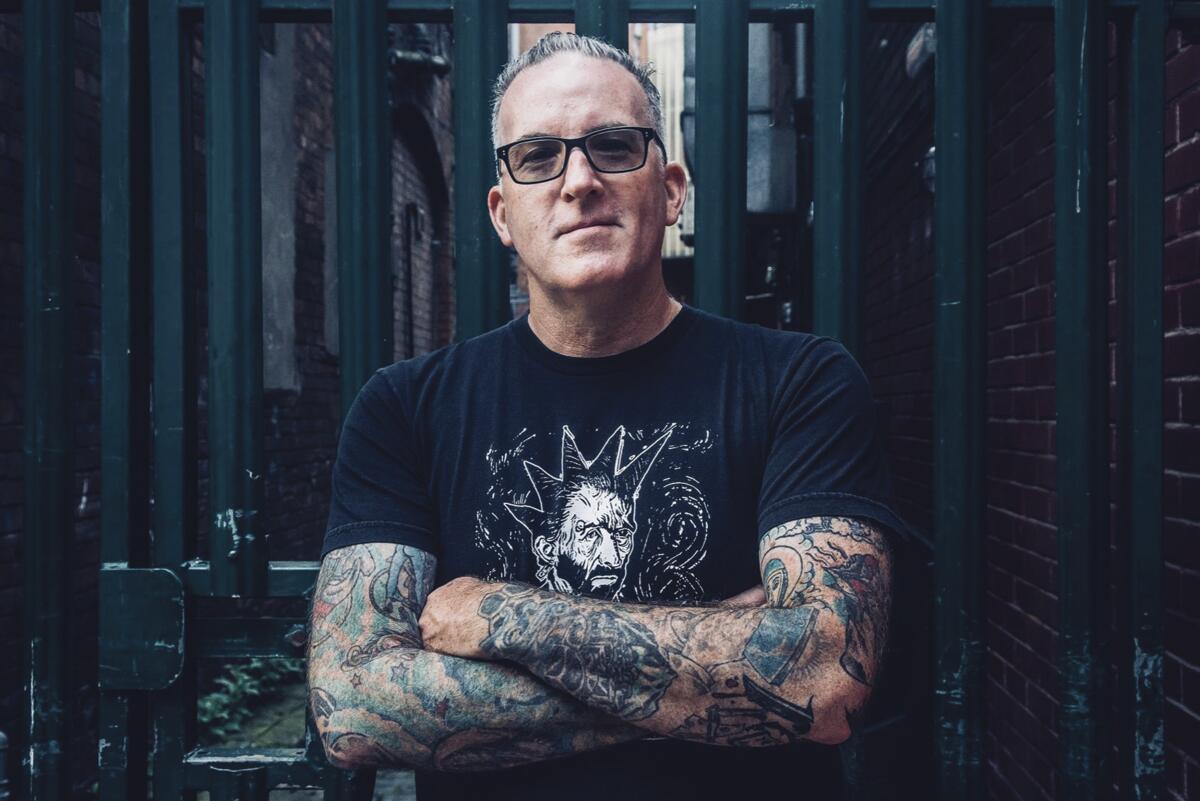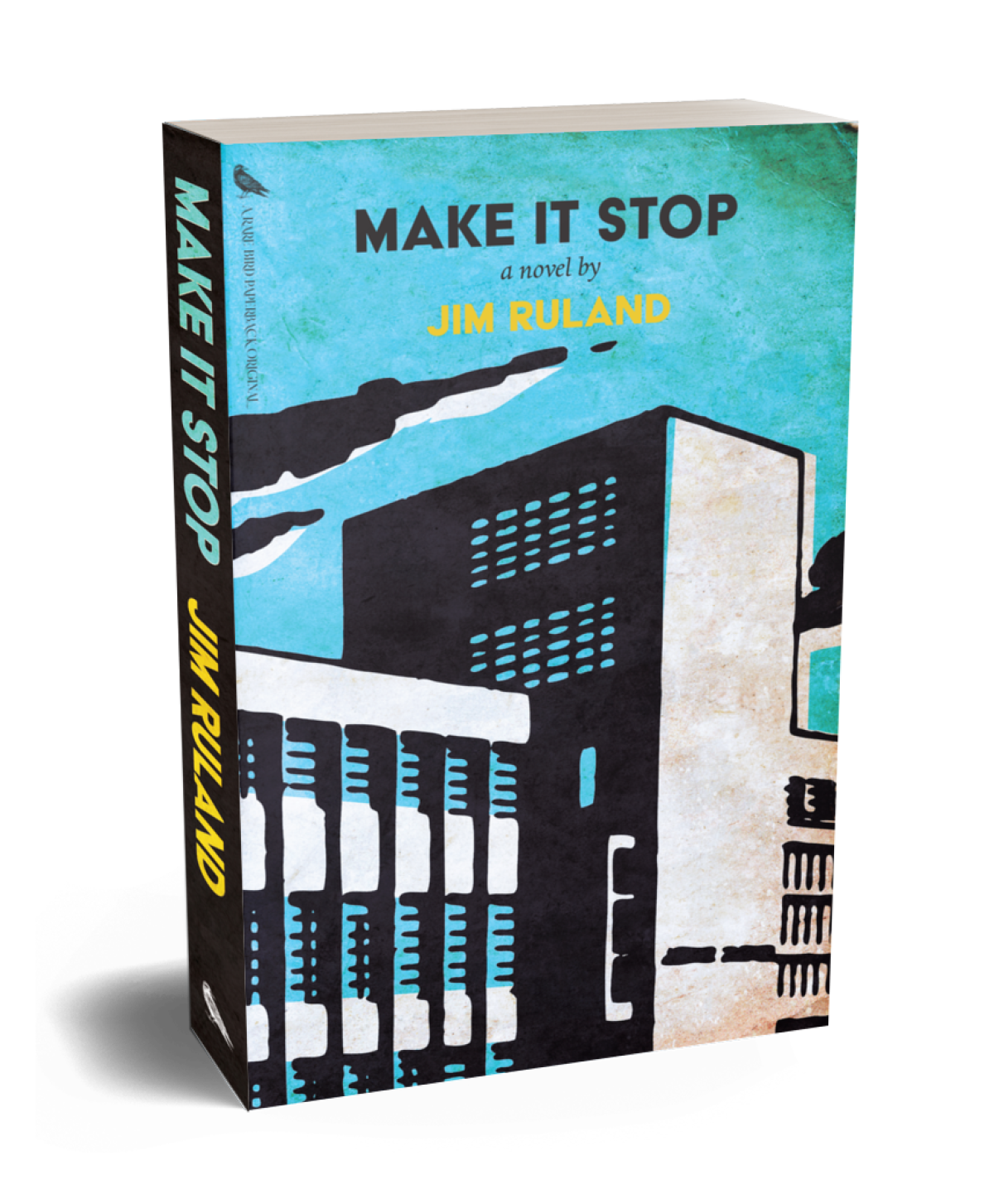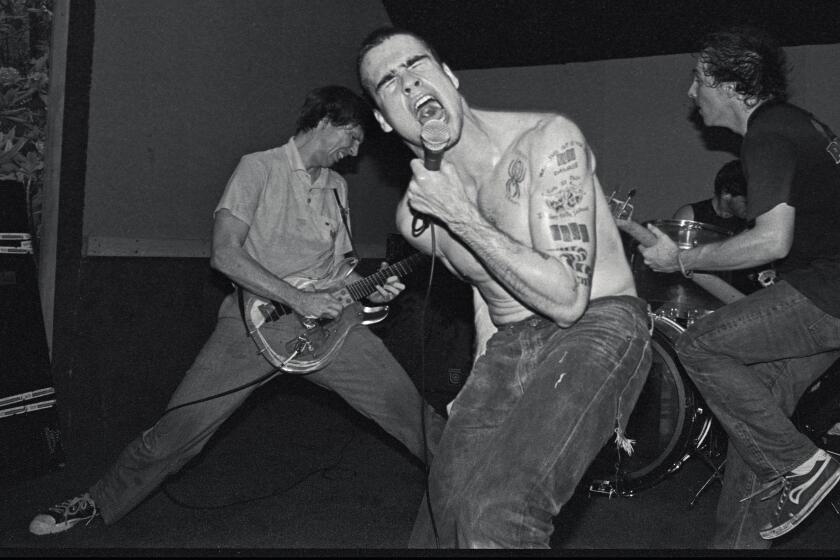This spring’s strongest critique of Big Pharma may be a ripping L.A. crime novel

- Share via
Review
Make It Stop
By Jim Ruland
Rare Bird: 256 pages, $20
If you buy books linked on our site, The Times may earn a commission from Bookshop.org, whose fees support independent bookstores.
Everyone knows that healthcare in this country is broken, but no one has written a ripping crime thriller about it, until now. In “Make It Stop,” Jim Ruland takes his readers on an adrenalized thrill ride set in the near-distant future that in fact has a lot to say about our present health-industrial complex and its voracious appetite for profit at the expense of public welfare.
Ruland, an L.A.-based author of crime novels, short stories, essays and a clutch of excellent histories of SoCal punk rock, sets his story in a Los Angeles that feels inevitable, a city whose sports teams have been renamed after multinationals (the Exxon Dodgers) and where people talk to each other’s holographic avatars, or “holos.”
By the time the fourth round of shots and beers arrives at our table at the karaoke bar in Dutch Harbor, Alaska, the crab fishermen are no longer paying attention to me.
The multibillion-dollar healthcare racket is rotten at the root. Greedy corporations have adulterated public wellness, its healthcare providers functioning more like venal debt collectors than caregivers. In other words, the big business of making people feel better in “Make It Stop” is only slightly more dysfunctional than it is now: Hospitals are debtors’ prisons, patients are held captive, and there is no revenue stream quite like drug addiction.
Ruland’s evil empire is Health Net Secure, a mega consortium that has cornered the rehab business in L.A. by fostering a toxic and seemingly endless codependent relationship with the patients the company is supposed to be curing. HNS will take you in, but it won’t let you out unless you pay extortionate fees. This conditional release policy requires its patients to square up their bills in full once treatment is completed. If not, the patients are remanded to detention centers that function as medieval torture chambers, albeit with anodyne names like Evergreen and the Colony.

Leading the resistance is a group called Make It Stop. Its leader, Doyle, has tasked his team of vigilantes, most of them recovering addicts, with freeing rehab patients who will otherwise shrivel up and die in HNS’ gulags. But there’s a catch: Make It Stop operatives must fake addiction and their own identities to gain access to the corporation’s care facilities.
Melanie Marsh, the protagonist of Ruland’s wild ride, is an ace operative at Make It Stop, an addict who tends to “mix up happiness with the mindlessness of intoxication” and recites recovery mantras like “no feelings, only choices” while she goes about her rough business, forever on the precipice of self-immolation. Having a gig that entails busting other addicts out of prison is a questionable choice for her, but no one understands addictive behavior like an addict, and Melanie is very good at her job. Brash and whip smart, she is the novel’s heartbeat, the shoot-from-the-hip scoundrel you love to root for.
Greg Ginn started a record label that brought the world Sonic Youth, Hüsker Dü, the Minutemen and more. A photo book and a deep history tell his tale.
“Make It Stop” is a crime novel tucked inside a social critique, but as in all good dystopian thrillers, the horror is grounded firmly in character. Chasing malefactors is how Melanie tries to outrun her past, but the job only bridges the distance, until she is forced to confront her own brokenness. Ruland has himself gone through the personal hell of recovery, which is perhaps why Melanie’s internal struggles have the hard sting of truth.
The book opens with a pumped-up set piece: Melanie is trying her level best to “discharge” a pill-popping rich kid named Michael from a nasty place called Western Psych, but not before he swipes Melanie’s hydrocodone stash and fatally overdoses. Melanie is taken down a few notches for the botched assignment, replaced in the hierarchy with the gorgeous Viviana (who might have her sights on Melanie’s boyfriend too). Intent on personal and professional redemption, Melanie has a hard road ahead of her.
After Melanie and the MIS team get wind of the insidious pleasures to be had from Bliss, a new sex-enhancing drug that is quickly pulling countless users into its undertow, her remit expands into something much larger and more pernicious: stop Bliss from pulling every addict in America into its force field, thereby turning Health Net Secure into its own police state.
Ruland is a lean, mean prose stylist; his novel’s serpentine plot speeds and swerves like a souped-up Corvette with afterburners. He’s also funny, as when he peeks inside the mind of Health Care Net’s CEO, Derek Hansen, a man so deranged by his own power that he could “send a surgeon out for sushi” like a TaskRabbit gofer if he were so inclined. Or when Melanie cases a punk club called the Cattle Prod, with “the three burly shirtless beardos who bodysurf off one another’s slick bellies” and “the big rockabilly guy … with fake pearl snaps and sleeves cuffed to show off his sailor tats even though he doesn’t know how to swim.”
Margot Douaihy’s “Scorched Grace” is a dark love song to Catholicism and New Orleans and a thriller after “Gone Girl” writer-turned-publisher Gillian Flynn’s heart.
Ruland has conjured up wonderful ways to put the big hurt on someone (impaling your sexist date via breadstick is a particular favorite), but Melanie is the novel’s emotional core. When the dust clears, and the city is (temporarily) safe from bloodsuckers like Hansen, she emerges with a settled mind and a path toward serenity that doesn’t involve whupping evildoers upside the head. Melanie unclenches herself and forgives herself, at least for the time being.
“Make It Stop” is demented in the best possible way. Here’s hoping Ruland delivers on his tease at the conclusion and conjures up a sequel.
Weingarten is a writer in Los Angeles.
More to Read
Sign up for our Book Club newsletter
Get the latest news, events and more from the Los Angeles Times Book Club, and help us get L.A. reading and talking.
You may occasionally receive promotional content from the Los Angeles Times.









